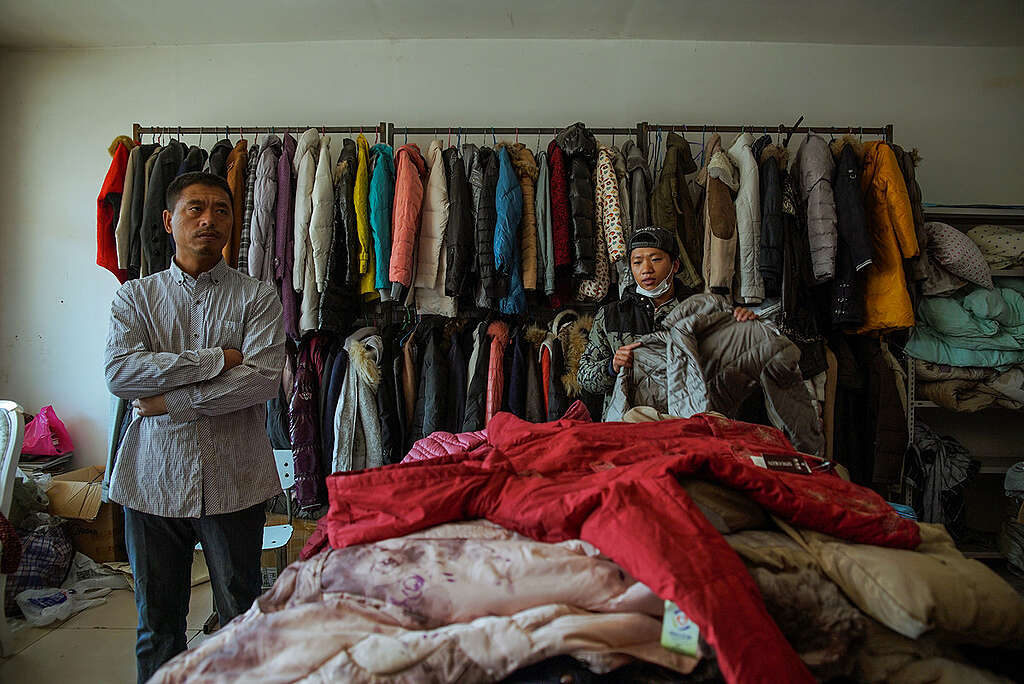"So many shopping festivals this year!" the young man explains. "Every day is a shopping festival."
Then, the calls suddenly start coming in. Delivery drivers bring products that were never purchased. Discount prices and "unbelievable sales" start ringing in their ears. It's all-consuming, highly annoying, and downright scary – there's no escaping China's shopping holidays!
That's the joke at the center of this skit from Papi Jiang Papi酱, a skit comedian well known in China. But for her fans, the frustration is all too familiar.
"Delete the orange app and you'll be fine!" she yells in the skit. For any shopper familiar with China's e-commerce platforms, that's Taobao, a major shopping app owned by Alibaba.
"The red app has shopping festivals, too!" her friend replies, a reference to Pinduoduo, which is owned by the same company as Temu, a platform that has recently gained quick popularity in the US and UK for its super cheap products, where you can "shop like a billionaire".
The horror-themed skit tells a real life story that frustrates many young people in China: the salesmanship of consumerist shopping holidays awaits them every time they open their phones, whether they have the money or not. Pop ups for new sales haunt them. Tempting, but ultimately empty, promises of cheap purchases follow them wherever they go.
Escaping from the platform
It's difficult to escape, in part, because these sales are pushed on the platforms managed by what in China are called platform companies. Alibaba, Pinduoduo, and Tencent are all platform companies, because they manage huge platforms. And their reach is inescapable.
At Greenpeace East Asia, Beijing we strategically push platform companies to apply this leverage for good, not evil. Over the years, we have campaigned on the climate, biodiversity, and waste impacts of consumerism for years: as early as 2016, we called out the risks of consumerism; in 2017, we calculated CO2 emissions from clothing sales, which we found produced 258,000 tons in a year – equivalent to the CO2 absorbed by 2.58 million trees. And by 2019, we were tackling packaging waste and how unnecessary over-packaging has become a frequent frustration for people buying goods online in China.

Over that time, we've seen how people around China have started to sour to the salesmanship that barks at them each year as November begins. These platform companies have to move beyond the bottom line and think about their responsibilities to both the consumer and the environment. So in 2021, we published our first e-commerce platform ranking, evaluating how companies pledge and manage their environmental commitments.
This year, Greenpeace East Asia, Beijing released another ranking of how e-commerce platforms perform on climate, biodiversity, waste, and overseeing chemicals sold in products. We examine their commitments, what they say they'll do, and whether they do it, by observing what actions they've taken to support sustainable use. Ultimately, we ask: are they using their platform the way they could?
Overall, we found that platforms are warming up to action on climate, and we're watching closely how this translates into action.
No progress from Pinduoduo
Pinduoduo, China's second-largest e-commerce platform in terms of total users, has been successful in attracting thrifty Chinese consumers during this year's Double Eleven sale season. The platform's flagship subsidy program has covered over 620 million users, making it a popular choice among more cost-conscious buyers as China's economy slows.
However, despite its popularity among consumers, Pinduoduo has once again ranked the lowest in the latest Greenpeace East Asia, Beijing e-commerce ranking, which covers Alibaba, Vipshop, JD.com, ByteDance, Kuaishou, and Pinduoduo. This is not the first time Pinduoduo has found itself at the bottom of the list, as it also ranked last in 2021's ranking.
This ranking evaluates and scores the environmental performance of the above e-commerce companies in China with an updated set of criteria, which consists of three pillars and four environmental issues. While some companies have made progress, Pinduoduo has not disclosed any information related to climate change and environmental action.
The growth of PDD Holdings, the parent company of Pinduoduo and Temu, has been incredibly rapid. However, this growth has come at a cost, as the company's lack of action on climate and environmental issues has become more apparent. Pinduoduo and PDD Holdings must take action now by setting decarbonization goals, disclosing information on climate and the environment, and building a corporate government structure dedicated to such issues.
Qilin Liu is the International Communications Officer at Greenpeace East Asia, Beijing






